Hans Edwin Winzeler, a cider maker with Pennsylvania-based Ploughman Cider, is currently spending a 10-month sabbatical in Herefordshire, England. Through employment or volunteering with local producers this season, Hans is able to see firsthand what methods, techniques and practices they use. He’s also gotten to know a few of these cider makers, and he is conducting a series of interviews for Cider Culture to share their stories.
Just a quick editorial note: The opinions of this interview subject do not reflect the opinions of Cider Culture.
Julian Temperley is the founder of the Somerset Cider and Brandy Company, the first licensed cider brandy distiller in the UK. He is also the owner of Burrow Hill Cider, named after a 250-foot tall mound on site with its large sycamore tree growing from the top. (Legend has it that King Arthur is buried there.) In 2014, Julian was awarded a gold medal at the Bath and West Show, a top award given for services to the cider industry.
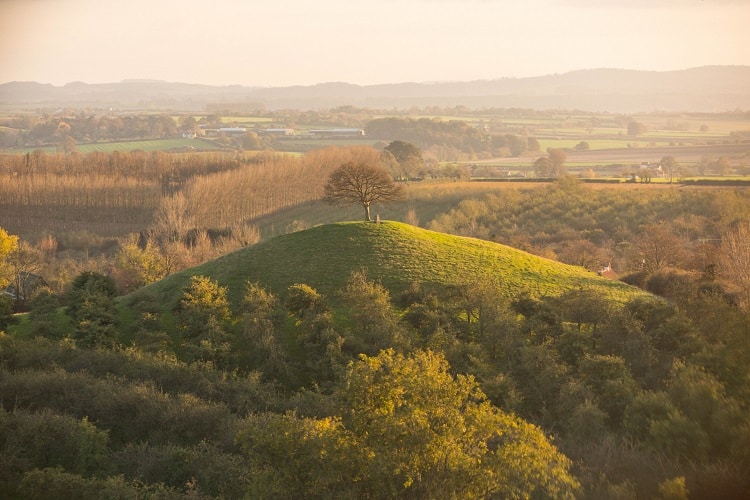
Burrow Hill
After working with his team for a day-and-a-half culling apples, I asked Julian to answer some of my questions. He generously agreed and invited me into his kitchen, where we first tasted some cider and then sat down to chat over cups of hot coffee. Julian has a well-deserved reputation for speaking his mind in a forthright way and is certainly not one to suffer fools gladly.
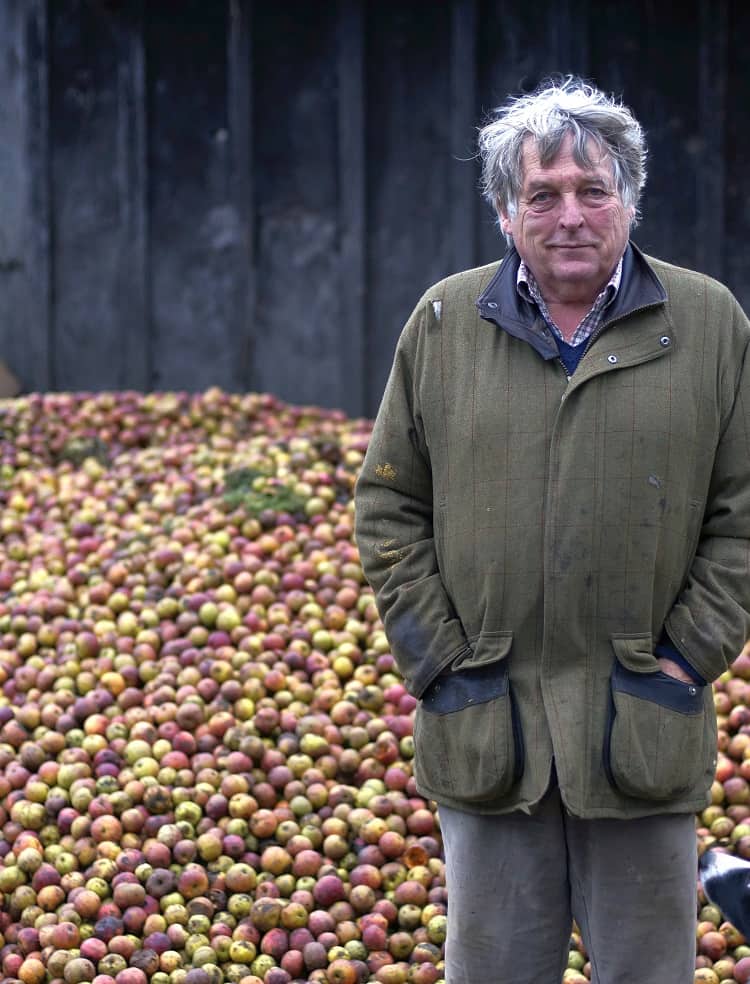
Hans Edwin Winzeler: How did you get into cider making?
Julian Temperley: I worked at a farm in Africa before I was 20, and it was a nice, fun, romantic time. I wanted to be a farmer. I came back to England and I had a great aunt who died, and in the process, I ended up with the first 5 acres and gradually came here [Pass Vale Farm], which is 20 acres. Now we have 250 acres, mostly of orchard.
Pass Vale Farm Burrow Hill was always one of the most renowned farms in Somerset for making top-quality cider. Farming has gotten more industrial and cider making has got more interesting and, gradually for us, it’s taken over everything we do. So it’s been a fun journey. We now make 100 times more than we did when the farm was first there, and we have 40 times more orchards.
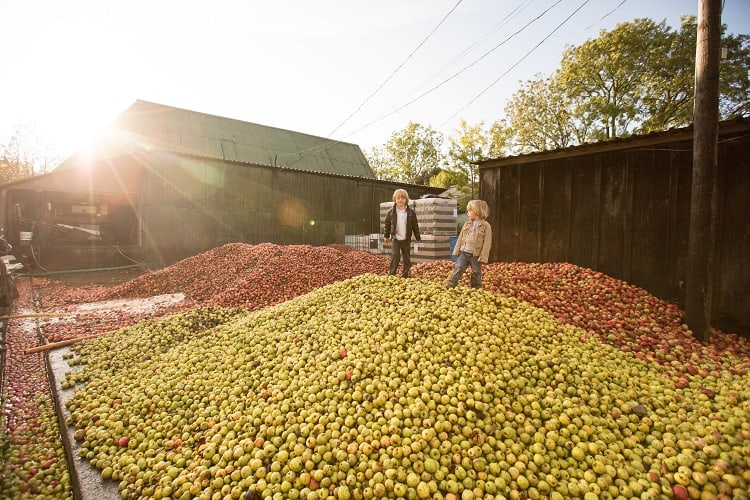
What makes SCBC unique?
We are part of the old cider making tradition. We have a fundamentalist approach to cider making. It has to be apples. We don’t want blasted fruit cider. We want to stick to apples, but we do have some of the best apples in the country. And so we win prizes. As you have seen today with some of the producers you have visited, such as Roger Wilkins, traditional cider making is the forgotten jewel of the English food and drink industry. So, slowly we’re selling the idea to the British public that they have something to be proud of. The English are wedded to the concept that quality comes from France. We are wedded to the concept of being inferior to Europe.
We are effectively the only apple distillers in England. When we began making brandy, for the cider industry it completed a circle. Our cider farm now has apple juice, ciders of different descriptions, and cider spirit, eau de vie, 3-, 5-, 10- and 20-year-old cider brandy, and it was the right thing for cider to have. Cider wasn’t just something that bubbled along at the bottom shelf at the supermarket. It came of age as an industry in exactly the same way as the wine industry has. Wine has grape juice, cognac, Armagnac and a whole range of great spirits that go with and alongside a good wine. So, we’re not claiming to be unique. We claim to be part of the cider industry. We have the provenance of 200 years here and 1,000 years of cider production in English history.
We now have a unique selection and knowledge of drinks made out of apples that go into the marketplace, which really has been ignored by the cider world for the last 100 years. And with cider we make nothing new, we just pick up the best of what’s been done in the past. From spirit to cider, we make a whole range. The further we go on, essentially the more unique we get. But, we start off with some of the best apples that the cider industry has to offer and that’s really important.
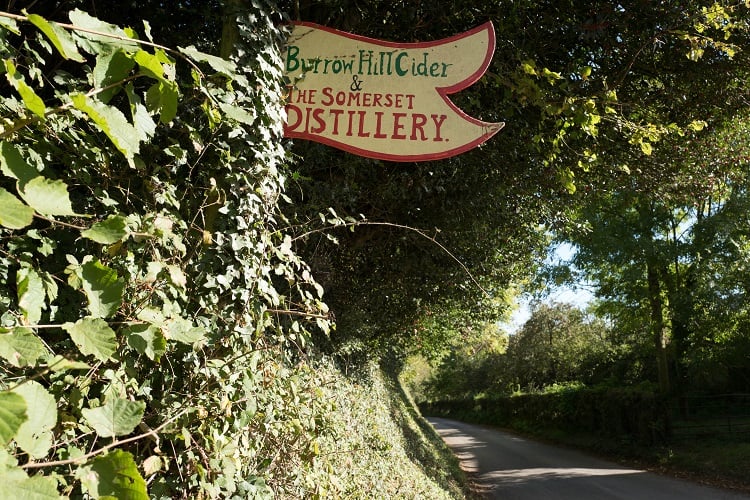
You’ve mentioned that class plays a role in how cider is viewed in England, can you please explain?
Cider is so completely off the scale when it comes to class. If you go to an agricultural show in England, farmers won’t buy cider. There’s something called Blue Nun, bloody awful German wine, from when mass-market wine first arrived in England, about 40 or 50 years ago. Our local show has Blue Nun and no other wine. But cider is too much to the roots. The Americans, I think they rather like their redneck roots. English are too uncertain to. So, we can’t sell cider to farmers at a show.
Is it fair to say cider is more central to English identity than wine is, but people reject it because of class insecurity?
Roughly, yes. We live in a county, Somerset, that doesn’t have an aristocracy. Partly because it floods, partly because you can’t hunt foxes because the land is pretty poxy. Land used to be owned by the church on the whole. And they sold it off in little patches. Other counties tend to have big landowners, families that might own tens of thousands of acres. In the Victorian times, the queen in a train through Somerset allegedly closed the curtains because it was a place of revolution and the peasantry were horrible.
But it has always been a place of non-conformity. One of the joys of Somerset is that the yeoman farmer, people like myself, we don’t have to doff our caps to anybody, and we don’t. Traditionally, the majority philosophy here would be sort of self-improvement education. And rather than taking instructions from people, we don’t have to think anybody is our betters [sic]. The small businessman, the small farmer is essentially king. And cider has always been the drink of Somerset.
When you look at developing cider cultures in other regions of the world what do you see, and what advice can you offer? In some areas cider production is expanding.
In your country, yeah, it’s unbelievable, it’s exploding. Americans are not so class-based as we are, and are open to new ideas. There are brilliant ciders in America, a great variety. You have a huge diversity of apples, you have an industrial sector for apple production and you have a great [pub] desert, I mean I think the chairman of your cider industry is … what’s his name? Uncle John [Mike Beck] opens his farm in the autumn and it’s got a landing strip for helicopters and airplanes. He expects to take considerably more than $100,000 a day, he lives beside the motorway and he causes a blockage up the motorway. He has 30 different tills selling different things. But you can drive 100 miles either way of his farm and you can’t find any pubs, you can only find an eatery, a diner, there’s nothing. So, obviously, there’s a huge interest. And you take your rural life very seriously, and it starts with a base of a monstrous population desperately wanting to do something in the countryside, whereas we’re not quite as adventurous as you.
In England, cider is divided into industrial and artisan. And now the industrial ciders have gone down the road of fruit cider, which is a disaster. In the industrial world anything goes … the whole cider market has been corrupted and debased. Thatchers Cider has to be, by law, 35% apple derived, which means 35% of its production has to have come from an apple somewhere, maybe in China, but an apple. And the other 65% is corn spirit from glucose, or whatever happens to be a cheapest carbohydrate in the market that can be fermented.
Bulmer’s was down 8% in sales last year, 8% the year before. The whole cider market has been down 5% a year for the last 6 years now, which is sort of a 42% drop in sales. And it’s almost entirely due to the fact that a product can’t ride two horses. It’s got to decide on which one it’s on. We, as artisan producers, have to go down a different way. We haven’t got the cleverness to manage to make a cider which is even drinkable out of 35% apple. We have to actually go down the road of fermenting the whole apple [full juice].
I suppose the industrial boys take their inspiration from the world of lager, which in the cider world means turning everything into concentrate and fermenting throughout the year and enhancing the flavor with this, that and the other thing, and producing something which is cheap as cheap can possibly be. We need to go down the road of the winemaker, which means that we have 300 varieties of cider apple to choose from — possibly another 2,000 varieties of dessert apples — and make ciders that do justice to the apples that went into them. It must be apple and apple and apple, just as wine is grapes. At the very least, we need to have traceability back to an orchard. And we need to do things like that, like you’d expect with a decent wine.
If you point out that cider isn’t wine, I’d agree. But if they can do that with their wine, the customer requires it to be done by us. And we have jokers who make single-variety ciders, which is, if you can make it out of apples, jolly good. But, if you’ve had to adjust the acidity chemically, then you should at least have the nerve not to call it single variety. We just managed to ban fruit ciders from the Bath and West Cider Competition because they are not cider, and they never have been. They are not taxed as cider, not defined as cider in the English law.
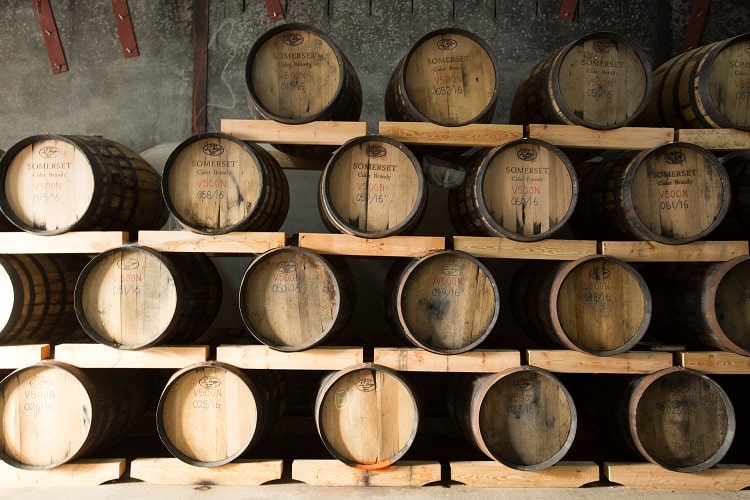
Some of your cider gets turned into brandy, and some you sell as cider. Is the balance between the two product lines pretty well established, or is it changing?
We have 100,000 gallons (455,000 L) of cider for selling and 100,000 gallons for distilling. In due course, distilling will increase. We picked up distilling at the same time as Bertram Bulmer of the Hereford cider making family. And, when he was in his 80s and he retired from running Bulmer’s, he ran his museum [The Hereford Cider Museum], and had permission for a museum still as an educational facility. He was one of the richest men in England and could expect the government to be a little bit kind to him.
We benefited hugely from that … I was sitting in his office in Hereford and I said something about mystique and he jumped out of his chair. He was a very rude, angry old man. He said, ‘I’m always telling the buggers in my company about mystique, but they never listen.’ He understood mystique, which is the basis of any drink. In spirit we have barrels. We have warehouses. We have time. It all adds up to that word ‘mystique.’
What do you see as some global trends in cider today?
The trend in cider is to get it onto a dinner table in restaurants. And our best restaurant we supply is Noma in Copenhagen, which is [considered to be] the world’s best restaurant. We all have to go upmarket. That is the advice for all cider makers. And, you can actually make some bloody good cider. But, to take the philosophy of wine and put it into cider, to me is entirely normal.
We went to a restaurant chain in Bristol last night to agree on their plan to sell our cider and cider brandy. They make 10 million a year and are taking a sort of fundamentalist approach to sourdough pizza making to 42 smart restaurants so far. They brought their wine man and the only dodgy opinion he had was that our 20-year-old cider brandy tasted like some sort of whiskey. And I said, ‘Is that a bad thing?’ And he said no. They had a very limited wine range. That they wanted our dry cider was surprising, but we did get everything the wine advisor liked. He said the cider brandies were astoundingly good.
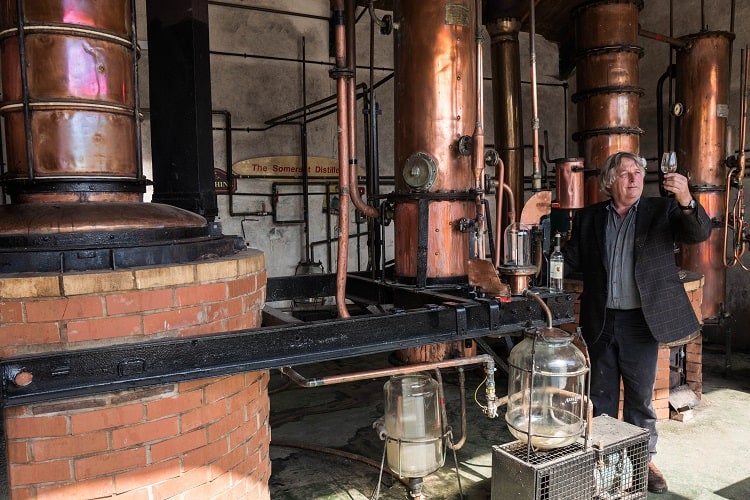
He told us how good our distiller was, and I told him he died. But we had two other guys that did it now. But, it was a great pleasure. But what I can’t understand, in the English cider industry is that Thatcher has the staff, the technology, the apples, the money, the design team and he’s got nothing which is designed … to put his products on a top shelf or somewhere in a wine show. There’s no reason for cider to bubble along at the bottom end of the market.
- Portrait of Julian Temperely: Hans Edwin Winzeler
- All other photos: Matilda Temperley